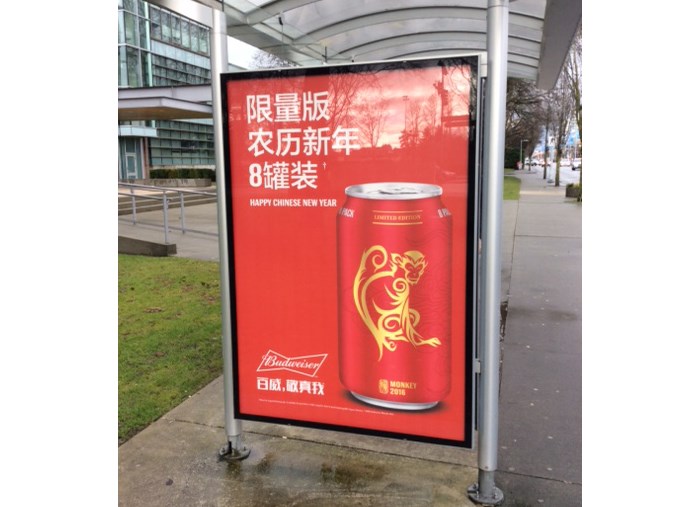Richmond city councillor Chak Au has raised another red flag over how language is being portrayed in the city.
Not all bilingual (such as Chinese-English) signs are equally so and those making them aren’t necessarily ethnic Chinese-owned businesses, noted Au.
This week, Au said his attention was drawn to a special Chinese New Year Budweiser ad on a Jim Pattison Outdoor Advertising bus shelter, in front of city hall. The company removed the ad on Tuesday after the city notified it of Au’s concerns.
Most of the ad is translated in some form, however, the size of the Chinese writing is much larger.
“If someone doesn’t read Chinese they don’t have enough info. And people are concerned about the big Chinese lettering. I don’t think they can relate,” said Au.
Such an ad would be considered a bilingual sign by city standards, despite not being entirely bilingual.
Presently, according to city spokesperson Ted Townsend, the city defines a “mixed language” sign as any sign that contains English in which “a member of the public can ascertain what the business is and what type of services it provides.”
Therefore, a restaurant sign that contains its name in English but has extra information in Chinese only is nevertheless considered bilingual.
Au said such signs “need improvement.”
In using such a definition, the city stated, last March, that 4.5 per cent of all sign permits issued since 2012 were non-English.
In 2015 there was a sharp increase in “mixed language” sign permits (58 per cent of all permits).
Equally important to Au is the fact that the city’s education campaign for inclusive and multilingual signage cannot address signage outside of municipal regulations (such as bus stops). Also, the non-Chinese business community must also become part of the campaign.
“The issue has always been Chinese people are not respecting the mainstream — they put too many ads in Chinese only. But the other side is we have other (non-Chinese) agencies doing the same. …It’s not just Chinese people,” said Au.
The two-term councillor expressed frustration that Richmond continues to be divided by language. But he said the Chinese community is working to help new immigrants build bridges with the non-Chinese community, but integration will take time.
“I think when people do these things, they don’t do it to offend. They don’t know what they don’t know,” said Au, who remains opposed to a language bylaw for signs.
Au said while the city could have done a better job when language barriers became prevalent in the late 1990s, it is now on the right track.
Community activist Kerry Starchuk, who contends English must remain a common language in public, said she isn’t convinced that’s the case.
Starchuk noted a new sign inspector/educator is only temporary.
She said she agrees with Au in that all businesses and ad companies need to address the issue.
“What we’ve got here is businesses ethnic marketing,” said Starchuk.
“My (English-speaking, ethnic Chinese) friend goes to The Bay and is handed Chinese (ad) literature. They just look at the colour of her skin. This is a dangerous route we are going down,” said Starchuk.



